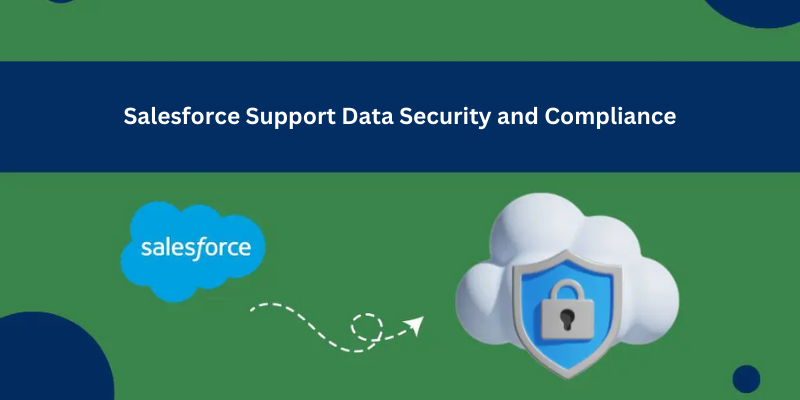Salesforce is a leading cloud-based customer relationship management (CRM) platform that helps businesses manage customer interactions, sales, and data. It offers tools for marketing, sales, service, and more, enabling organizations to streamline operations and enhance customer engagement. Salesforce provides robust tools and features that ensure data security and compliance with industry regulations, protecting sensitive information and maintaining regulatory standards. This blog explores how does Salesforce support data security and compliance. Join Salesforce Training in Jaipur at FITA Academy, which will help you acquire in depth knowledge in Salesforce CRM.
The Role of Salesforce in Data Security
Salesforce is a leader in cloud computing, with a robust security framework designed to protect data from unauthorized access, breaches, and loss. At the core of Salesforce’s security measures are encryption, authentication, and monitoring. Salesforce ensures data is encrypted at rest and in transit using industry-standard protocols, making it unreadable to unauthorized parties. Authentication measures like multi-factor authentication (MFA) further strengthen security by requiring multiple verification factors, reducing the risk of unauthorized access.
Salesforce also provides fine-grained access controls, enabling organizations to specify who can access certain data and what actions they can perform. This level of control is essential for maintaining data integrity and preventing unauthorized changes.
Compliance with Industry Regulations
Salesforce is committed to helping organizations meet industry regulations such as HIPAA, GDPR, and CCPA. Tools like Salesforce Shield offer features like Event Monitoring, Platform Encryption, and Field Audit Trail, designed to support compliance. Additionally, Salesforce supports data residency requirements, allowing organizations to store data in specific geographic locations to comply with local laws. This flexibility is crucial for organizations operating in regions with strict data sovereignty laws, ensuring they can remain compliant while benefiting from cloud services.
Constant Auditing and Monitoring
To maintain security and compliance, Salesforce provides extensive auditing and monitoring capabilities. Features like Event Monitoring and Field Audit Trail capture detailed logs of user activities, such as login attempts and data exports. These logs are essential for identifying potential security threats, conducting forensic investigations, and demonstrating compliance during audits. Salesforce also allows organizations to set up automated alerts for suspicious activities, enabling them to respond proactively to potential security issues.
Data Masking and Encryption for Enhanced Privacy
Salesforce enhances privacy protection through data masking and encryption. Data masking alters sensitive information with fictional data, ensuring that unauthorized users cannot access the original data. This is particularly useful when sharing data with external partners or during development phases. By masking sensitive data, organizations minimize the risk of breaches.
Salesforce also offers flexible encryption options, allowing organizations to encrypt specific fields or entire databases. This ensures that even if data is accessed by unauthorized users, it remains unreadable and compliant with industry regulations. Explore Salesforce Training in Delhi to get expert help that makes Salesforce concepts clearer with real-life examples.
Data Retention and Backup for Compliance
Salesforce provides customizable data retention policies, allowing organizations to define how long data should be retained and when it should be deleted. This is crucial for compliance with regulations like GDPR, which mandate the deletion of data after a certain period. Salesforce’s robust backup options ensure that data is regularly backed up and can be restored in case of accidental deletion, system failures, or breaches, maintaining business continuity.
Customizable Security Settings for Tailored Protection
One of the key strengths of Salesforce’s security framework is its flexibility and customization options. Organizations can tailor Salesforce’s security settings to meet their specific needs and regulatory requirements. This includes defining custom security policies, configuring access controls, and setting up automated security processes. Salesforce also allows organizations to integrate third-party security tools, providing additional layers of protection and enhancing the overall security posture.
Customizable security settings are particularly important for organizations with complex security requirements or those operating in highly regulated industries. By allowing organizations to tailor their security settings, Salesforce ensures that data is protected in a manner that aligns with the organization’s unique needs and compliance obligations.
Proactive Security Measures and Updates
Salesforce remains proactive in addressing emerging security threats by regularly updating its platform with the latest security features and patches. Salesforce’s security team continuously monitors the threat landscape, identifying and addressing potential vulnerabilities before they can be exploited.
Alongside regular security updates, Salesforce provides organizations with the resources to stay informed about security best practices and regulatory changes. The Salesforce Trust site offers real-time information on system status, security updates, and compliance certifications, ensuring organizations have the transparency and tools they need to maintain a secure environment.
Salesforce’s comprehensive security measures and compliance tools make it a trusted platform for protecting data and meeting regulatory requirements, ensuring organizations can operate securely and confidently in the cloud. Enrolling in Salesforce Classes in Pune gives people a solid understanding and hands-on skills to use the Salesforce platform effectively.
Also Check: Salesforce Interview Questions and Answers
